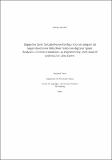Doppeltes spiel: Selbstreflexive konfigurationsstrategien als gegenstand einer kritischen textpraxis digitaler spiele. Analysen und interpretationen zu Vagrant Story, Dark Souls III und Horizon: Zero Dawn
| dc.contributor.advisor | Pusse, Tina-Karen | |
| dc.contributor.author | Weidlich, Andreas | |
| dc.date.accessioned | 2020-05-11T07:37:58Z | |
| dc.date.issued | 2020-05-07 | |
| dc.identifier.uri | http://hdl.handle.net/10379/15954 | |
| dc.description.abstract | Seen as a comparatively recent phenomenon, digital games continue to challenge academic discourse. The study argues that digital games are best understood as both complex configurational practices as well as audio-visually presented, ludic (hyper)texts. This non-essentialist view of games focuses on structural couplings established between the medium and its cultural background: By offering an in-depth reading of several works, the study demonstrates how three titles are able to reflect their own mediality, offering a compelling criticism of popculture in the process. | en_IE |
| dc.publisher | NUI Galway | |
| dc.rights | Attribution-NonCommercial-NoDerivs 3.0 Ireland | |
| dc.rights.uri | https://creativecommons.org/licenses/by-nc-nd/3.0/ie/ | |
| dc.subject | Game Studies | en_IE |
| dc.subject | Video Game | en_IE |
| dc.subject | Digital Games | en_IE |
| dc.subject | Game Criticism | en_IE |
| dc.subject | Media Studies | en_IE |
| dc.subject | Culture Studies | en_IE |
| dc.subject | Reflexivity | en_IE |
| dc.subject | Arts, Social Sciences & Celtic Studies | en_IE |
| dc.subject | Languages, Literatures and Cultures | en_IE |
| dc.subject | International Cultural Studies | en_IE |
| dc.title | Doppeltes spiel: Selbstreflexive konfigurationsstrategien als gegenstand einer kritischen textpraxis digitaler spiele. Analysen und interpretationen zu Vagrant Story, Dark Souls III und Horizon: Zero Dawn | en_IE |
| dc.type | Thesis | en |
| dc.description.embargo | 2024-04-29 | |
| dc.local.final | Yes | en_IE |
| nui.item.downloads | 1 |


